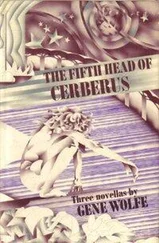I nodded. I had found Stromboli at last, standing in a corner. His face was perfectly impassive while his fingers flew over the levers of Zanni’s controller. I said, “Joruri.”
“ Joruri , sir?”
“The Japanese puppet theater. The operators stand in full view of the audience, but the audience pretends not to see them.”
“That is the master’s field, sir, and not mine, but perhaps that is the best way.”
“Perhaps. But now I’ve got to catch my ship.”
“So you said to Madame Lili earlier, sir. The master begs leave to remind you that he was once a young man very like yourself, sir. He expresses the hope that you know with whom you are keeping faith. He further expresses the hope that he himself does not know.”
I thought of the fine cracks I had seen, under the cosmetics, in Lili’s cheeks, and of Charity’s cheeks, as blooming as peaches.
Then I took my second-best pair of shoes, and went out to the ship, and climbed into my own little box.
Afterword
Now it seems that all toys are high tech. Goodness knows there’s nothing wrong with high-tech toys, but it seems to me that we had just as much fun with low. Can I have been alone in playing with puppets and marionettes?
There was once a marionette in the form of a robot with a spiked club, and a blond boy with a sword who was to fight him. Best of all, there was a puppet, just one puppet, a grinning monkey. I wish I had him still.
G. K. Chesterton had a toy theater, doubtless with a princess, Saint George, and a dragon. Back then they were a penny plain and tuppence colored, but if you got the plain sort you had the pleasure of coloring everything to suit yourself. You might have a princess with fiery red hair, if you liked, and a flaxen dragon. Years after my monkey had returned to the jungle (or wherever), I read about Chesterton’s theater with pleasure. By then I already knew of certain sad toys possessed by adult men.
And long years after I had finished this story and sold it, and almost forgotten it, I set out to write a circus story to be called “On a Vacant Face a Bruise.” Chesterton had never really forgotten his toy theater, and I soon learned that I had never really forgotten mine.
The Fifth Head of Cerberus
When the ivy-tod is heavy with snow,
And the owlet whoops to the wolf below,
That eats the she-wolf’s young.
Samuel Taylor Coleridge, “The Rime of the Ancient Mariner”
When I was a boy my brother David and I had to go to bed early whether we were sleepy or not. In summer particularly, bedtime often came before sunset; and because our dormitory was in the east wing of the house, with a broad window facing the central courtyard and thus looking west, the hard, pinkish light sometimes streamed in for hours while we lay staring out at my father’s crippled monkey perched on a flaking parapet, or telling stories, one bed to another, with soundless gestures.
Our dormitory was on the uppermost floor of the house, and our window had a shutter of twisted iron which we were forbidden to open. I suppose the theory was that a burglar might, on some rainy morning (this being the only time he could hope to find the roof, which was fitted out as a sort of pleasure garden, deserted), let down a rope and so enter our room unless the shutter was closed.
The object of this hypothetical and very courageous thief would not, of course, be merely to steal us. Children, whether boys or girls, were extraordinarily cheap in Port-Mimizon; and indeed I was once told that my father, who had formerly traded in them, no longer did so because of the poor market. Whether or not this was true, everyone—or nearly everyone—knew of some professional who would furnish what was wanted, within reason, at a low price. These men made the children of the poor and the careless their study, and should you want, say, a brown-skinned, red-haired little girl or one who was plump or who lisped, a blond boy like David or a pale, brown-haired, brown-eyed boy such as I, they could provide one in a few hours.
Neither, in all probability, would the imaginary burglar seek to hold us for ransom, though my father was thought in some quarters to be immensely rich. There were several reasons for this. Those few people who knew that my brother and I existed knew also, or at least had been led to believe, that my father cared nothing at all for us. Whether this was true or not I cannot say; certainly I believed it, and my father never gave me the least reason to doubt it, though at the time the thought of killing him had never occurred to me.
And if these reasons were not sufficiently convincing, anyone with an understanding of the stratum in which he had become perhaps the most permanent feature would realize that for him, who was already forced to give large bribes to the secret police, to once disgorge money in that way would leave him open to a thousand ruinous attacks; and this may have been—this and the fear in which he was held—the real reason we were never stolen.
The iron shutter is (for I am writing now in my old dormitory room) hammered to resemble in a stiff and oversymmetrical way the boughs of a willow. In my boyhood it was overgrown by a silver trumpet vine (since dug up) which had scrambled up the wall from the court below, and I used to wish that it would close the window entirely and thus shut out the sun when we were trying to sleep; but David, whose bed was under the window, was forever reaching up to snap off branches so that he could whistle through the hollow stems, making a sort of panpipe of four or five. The piping, of course, growing louder as David grew bolder, would in time attract the attention of Mr. Million, our tutor. Mr. Million would enter the room in perfect silence, his wide wheels gliding across the uneven floor while David pretended sleep. The panpipe might by this time be concealed under his pillow, in the sheet, or even under the mattress, but Mr. Million would find it.
What he did with those little musical instruments after confiscating them from David I had forgotten until yesterday; although in prison, when we were kept in by storms or heavy snow, I often occupied myself by trying to recall it. To have broken them or dropped them through the shutter onto the patio below would have been completely unlike him; Mr. Million never broke anything intentionally, and never wasted anything. I could visualize perfectly the half-sorrowing expression with which he drew the tiny pipes out (the face which seemed to float behind his screen was much like my father’s) and the way in which he turned and glided from the room. But what became of them?
Yesterday, as I said (this is the sort of thing that gives me confidence), I remembered. He had been talking to me here while I worked, and when he left it seemed to me—as my glance idly followed his smooth motion through the doorway—that something, a sort of flourish I recalled from my earliest days, was missing. I closed my eyes and tried to remember what the appearance had been, eliminating any skepticism, any attempt to guess in advance what I “must” have seen, and I found that the missing element was a brief flash, the glint of metal, over Mr. Million’s head.
Once I had established this, I knew that it must have come from a swift upward motion of his arm, like a salute, as he left our room. For an hour or more I could not guess the reason for that gesture, and could only suppose it, whatever it had been, to have been destroyed by time. I tried to recall if the corridor outside our dormitory had, in that really not so distant past, held some object now vanished: a curtain or a window shade, an appliance to be activated, anything that might account for it. There was nothing.
Читать дальше










